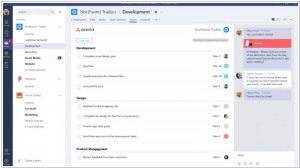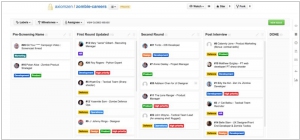Asana vs ZenHub
August 10, 2023 | Author: Michael Stromann
Asana and ZenHub are both project management tools that help teams collaborate, organize tasks, and track progress. Asana is a versatile platform that offers a wide range of features for managing projects, including task assignments, deadlines, file attachments, and integrations with various applications. It provides a visually appealing interface and flexible project views to suit different workflows. ZenHub, on the other hand, is specifically designed for software development teams and integrates seamlessly with GitHub. It offers agile project management features like Kanban boards, sprint planning, and GitHub issue tracking. ZenHub provides a streamlined workflow within the GitHub environment, making it a preferred choice for software development teams.
See also: Top 10 Issue Trackers
See also: Top 10 Issue Trackers
Asana vs ZenHub in our news:
2023. Asana launches new work intelligence tools with AI on the way
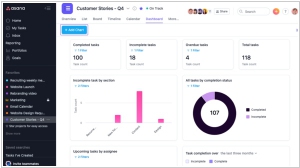
Asana has announced a new set of dashboards to give managers the data they need to make sure projects are staying on budget and meeting goals. This involves providing a single view of strategic initiatives, team capacity and budgets. It builds on the graph model that underlies the entire Asana platform, but the company is working to bring artificial intelligence to the process to make it even smarter. The next step will be using AI to generate the portfolios of the things that you care about instantaneously. So having them become smarter and smarter, but the fact that they can be at any level across an entire organization, that is part of this new launch
2021. Project management service ZenHub raises $4.7M
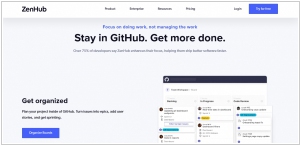
ZenHub, the project management service focused on GitHub integration for development teams, has successfully raised a seed funding round of $4.7 million. In addition to this achievement, the company has recently introduced its latest automation feature. This new feature aims to streamline the planning of development sprints, a critical aspect of the Agile development process that often consumes significant time and effort. By automating this process, teams can allocate their resources more efficiently towards actual development work. Furthermore, ZenHub has plans to develop an additional feature that automates certain aspects of the software estimation process. This upcoming tool will assist teams in assigning story points to routine action items, enabling more focused discussions on contentious issues.
2018. Work management software provider Asana gets $50M
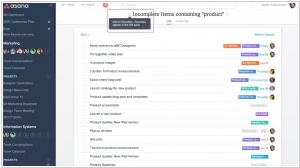
Asana, a platform utilized by teams and individuals to plan and monitor work projects, has secured an additional $50 million in funding, resulting in a valuation of $1.5 billion. The funding will be allocated towards international expansion and product enhancement. Asana has been actively focusing on global growth, with half of its new sales already originating from outside the United States. The company aims to further extend its product offerings while approaching profitability. As part of its expansion strategy, Asana plans to establish an AWS-based data center in Frankfurt within the first half of the upcoming year. Additionally, it intends to establish a stronger presence in the Asia-Pacific region, with new offices in Sydney and Tokyo, along with ongoing recruitment efforts in both markets. Asana's customer base spans across 195 countries and supports six languages. The company's decision to concentrate on these two regions stems from the significant traction it has observed in those areas.
2018. Asana launched $19.99 Business tier to help managers handle multiple projects
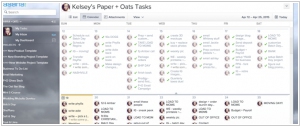
Project management service Asana is introducing a new tier called Asana Business, tailored for enterprises that handle multiple projects. Priced at $19.95 per user per month, this offering is specifically designed to support teams with managers or executives overseeing numerous projects simultaneously, which can sometimes reach thousands within a single organization. Asana Business provides additional features to aid designated individuals in effectively managing and prioritizing their workload. This emphasis on executives and managers aligns with Asana's broader vision of its role within the spectrum of productivity tools used by businesses. Alongside efficient storage solutions like Dropbox or Box and communication platforms such as Slack, Workplace, and Teams, Asana aims to establish its place as a comprehensive tool for enhancing organizational productivity.
2018. Asana adds AI-powered interactive project maps
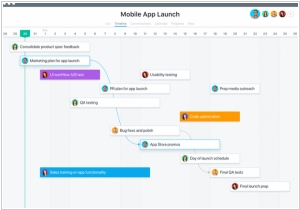
Workflow management platform Asana has introduced a new feature called Timeline, offering composite, visual, and interactive maps that illustrate the progress of various projects assigned to team members. This feature provides teams with a broader perspective on their collective workload and visualizes how projects interconnect in a timeline format. Timeline proves valuable in scenarios such as product launches, marketing campaigns, and event planning. Importantly, it does not require duplicating work or using separate software; instead, each project automatically becomes a distinct segment on the team's Timeline. It's worth noting that Timeline is exclusively available to paying users, while free users among Asana's extensive user base will need to upgrade to the premium tier to access this feature.
2018. Asana raised another $75M
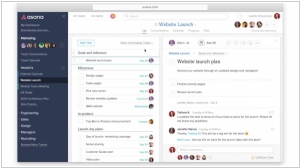
Asana, the renowned productivity and collaboration service, has secured a significant $75 million investment in its Series D funding round. In a blog post, Asana highlighted that 45 percent of its 30,000 paying customers are located outside of the United States. Among its notable clientele are prominent names like Tesco, Sky, Danone, Chanel, and Spotify. With this global reach in mind, Asana has announced its plans to introduce Spanish, Portuguese, and Japanese versions of its service, following the recent rollout of support for French and German. Including this latest funding, Asana has now successfully raised a total of $168 million from investors. Business Insider reported that the startup's current valuation stands at an impressive $900 million.
2016. Asana added Custom fields
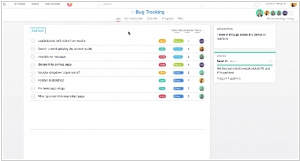
Task management app Asana is introducing a new feature called custom fields, which allows users to customize the information management system within Asana to accommodate various structured data points. With custom fields, companies can tailor Asana to their specific needs. For instance, a company conducting a recruitment drive can create a form within Asana to track additional details about candidates. Marketing teams can delve into larger plans and monitor specific campaigns, while engineering teams can utilize custom fields for bug tracking. Design teams can leverage this feature to provide more comprehensive insights and updates on major projects. Furthermore, Asana will integrate custom fields into its API, enabling users to explore new applications and utilize Asana as a customer-facing tool to efficiently gather and structure information in real time.
2016. Project management app Asana raised $50M
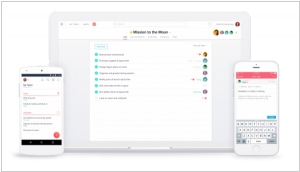
Asana, an application designed for team project tracking, has reached a valuation of $600 million with the support of YC's Sam Altman. As of today, Asana has garnered 13,000 paying businesses as customers, with over 140,000 businesses utilizing the product overall. This user base continues to grow by approximately 10,000 businesses each month. Asana offers both free and premium tiers, with the latter priced at $8.33 per member per month for groups larger than 15, granting access to additional features. With the increasing transition of business operations to online platforms, productivity applications are currently in high demand. Recently, BetterWorks, a similar platform for task and goal management, secured $20 million in Series B funding. Apart from BetterWorks and Asana, there are other productivity-boosting tools available such as Basecamp, Wrike, and Trello, all catering to the needs of organizing and enhancing the productivity of knowledge workers.
2015. Task management startup Asana launched major revamp

Collaboration service Asana has announced a redesign along with several new features aimed at enhancing its performance in the market. The updated version introduces new functionalities designed to streamline communication within the platform, reminiscent of popular services like Slack. Additionally, a tool has been developed to help users stay organized and informed within their existing work environments. Notably, the new Asana Conversations feature enables users to keep in touch with team members and create tasks within the Conversations section. Another noteworthy addition is a spreadsheet-like functionality that includes easy filtering and the ability to create dashboards. Asana will also notify relevant individuals involved in a task. Currently in beta, the Track Anything feature, offering expanded task tracking capabilities, is set to be released in early 2016.
2015. ZenHub connects its project management service to GitHub Enterprise
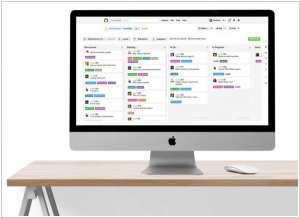
ZenHub, a platform designed to assist engineering teams in managing their GitHub projects using intuitive drag-and-drop task boards similar to Trello, was initially exclusively available for regular GitHub accounts. However, a recent development has expanded its accessibility. From now on, enterprise users who utilize the on-premise GitHub Enterprise service can also leverage the capabilities of ZenHub. This enterprise version of ZenHub distinguishes itself as one of the pioneering collaboration and project management services that seamlessly integrates with GitHub Enterprise. GitHub, along with Git as a whole, has been rapidly embraced within enterprise environments. Consequently, several project management services have emerged in the market, including startups like waffle.io (which also supports GitHub Enterprise) and various tools offered by Microsoft and Atlassian. What sets ZenHub apart is its direct integration with GitHub Enterprise, eliminating the need for developers to constantly switch between multiple disparate tools.

